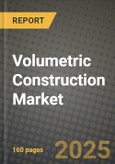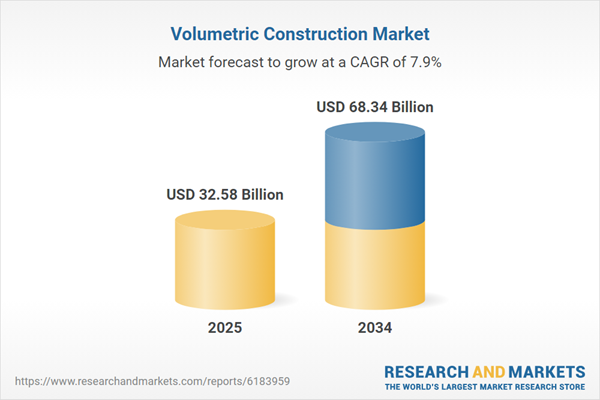Volumetric Construction Market
The Volumetric Construction Market is industrializing building delivery by shifting complexity from job sites to controlled factories where fully finished three-dimensional modules - structural frame, MEP, finishes, and façades - are produced, shipped, and assembled at speed. Core applications span multifamily and single-family build-to-rent, student housing, hospitality, healthcare and senior living, education, defense and workforce accommodation, retail/quick-service formats, and select office or lab fit-outs. Current trends include platformized product families (standardized grids, wall assemblies, and MEP chassis), BIM-to-factory toolchains with digital twins, greater use of mass timber alongside steel and precast concrete, and lean logistics with just-in-time yard management. Demand is propelled by schedule compression (earlier revenue), labor scarcity, predictable quality, site safety, and embodied-carbon goals via material efficiency and waste reduction. The competitive landscape features integrated volumetric manufacturers, EPCs partnering with module plants, regional specialists focused on schools and health, and technology providers offering configurators, automated QA, and production planning. Winning models combine standardization with mass customization, align platforms to local codes/fire ratings, and secure multi-project pipelines to balance factory utilization and working capital. Procurement is shifting toward early contractor involvement and outcome-based specifications (acoustic, airtightness, thermal), while warranty structures and lender familiarity steadily improve bankability. Headwinds include transport/cranage constraints for oversize loads, interface risk at site connections, code interpretation variability across jurisdictions, and supply tightness in key components (fasteners, fire-rated boards, HVAC controls). Overall, volumetric construction is moving from one-off innovation to repeatable, productized delivery that meaningfully improves speed, cost predictability, and sustainability across building types.Volumetric Construction Market Key Insights
- Industrialized delivery model: Shifting from bespoke site builds to productized manufacturing shortens project schedules by up to half, enabling just-in-time delivery and reducing dependency on weather or local labor availability.
- Material innovation: Structural steel and precast concrete dominate multi-story applications, while mass timber is emerging as a sustainable option for mid-rise and low-rise projects, offering lighter weights and carbon savings.
- Digital transformation: Integration of BIM, IoT sensors, and digital twins ensures real-time visibility across design, production, logistics, and installation - minimizing rework and strengthening quality assurance.
- Platform standardization: Developers increasingly adopt “kit-of-parts” systems with standardized modules and façade panels, improving scalability while allowing project-specific aesthetic and functional customization.
- Sustainability leadership: Modular factories optimize material utilization, reduce waste, and enable lower embodied carbon footprints - key to meeting net-zero construction goals.
- Operational resilience: Controlled factory conditions mitigate on-site risks, boost safety compliance, and stabilize output despite climate or workforce fluctuations, enhancing business continuity.
- Integrated supply chain: Long-term alliances between module manufacturers, MEP suppliers, and transport logistics firms improve reliability, reduce project delays, and lower lifecycle costs.
- Code harmonization & regulation: Governments are updating building codes to recognize volumetric standards, promoting certification systems that ensure safety, structural integrity, and design compliance.
- Investment and financing maturity: Growing confidence among lenders, insurers, and institutional investors is expanding capital access, especially for developers with proven modular track records.
- Market consolidation: Mergers between manufacturers and contractors are driving economies of scale, global expansion, and end-to-end delivery capabilities, creating stronger regional champions.
Volumetric Construction Market Reginal Analysis
North America
North America is witnessing rapid adoption of volumetric construction in multifamily housing, hospitality, and healthcare, driven by labor shortages and demand for rapid project delivery. Regulatory acceptance is improving through state modular programs and third-party approvals. Private developers value cost predictability and faster returns, while public agencies promote modular for affordable housing. Challenges include transportation limits for large modules and code fragmentation across states.Europe
Europe remains a pioneer with advanced adoption in the UK, Nordics, and Western Europe, where modular schools, hospitals, and social housing dominate. Stringent building energy and carbon regulations favor offsite manufacturing and low-waste construction. The UK’s government-led MMC policies and public procurement frameworks encourage factory-built infrastructure. Integration of renewable materials, precision façades, and lifecycle carbon tracking drive ongoing innovation and competitiveness.Asia-Pacific
Asia-Pacific is the fastest-growing region, led by China, Japan, Australia, and Singapore. High urban density, rising construction costs, and government support for industrialized building propel adoption. Japan’s precision manufacturing sets quality benchmarks, while China’s scale drives cost efficiencies. Australia emphasizes volumetric solutions for high-rise residential and remote resource projects. Localized manufacturing, digital design integration, and urban transport optimization are key success factors.Middle East & Africa
The Middle East and Africa region utilizes volumetric construction for hospitality, education, healthcare, and large-scale worker accommodation. Governments and developers in the GCC promote modular solutions for mega-projects and smart city developments. Desert climates require thermally efficient façades and durable materials. Partnerships with European and Asian manufacturers are expanding local capacity, while modular plants near urban hubs reduce import dependencies.South & Central America
Adoption in South and Central America is growing in affordable housing, hospitality, and education sectors. Brazil, Mexico, and Chile lead through pilot modular programs promoting cost control and sustainable design. Earthquake-prone regions prioritize structural integrity and quality assurance in factory-built modules. Local material sourcing, financing access, and workforce training are improving, while government housing initiatives enhance modular visibility and acceptance.Volumetric Construction Market Segmentation
By Product
- Relocatable
- Permanent
By End-User
- Residential
- Commercial
- Student Housing
- Others
Key Market players
Volumetric Building Companies (VBC), Vision Modular Systems, Premier Modular, Portakabin, The McAvoy Group, Wernick Group, Algeco (Modulaire Group), CIMC Modular Building Systems, Lindbäcks Bygg, ALHO Systembau, Moelven Byggmodul, Sekisui House, Daiwa House, Hickory Group, NRB Modular SolutionsVolumetric Construction Market Analytics
The report employs rigorous tools, including Porter’s Five Forces, value chain mapping, and scenario-based modelling, to assess supply-demand dynamics. Cross-sector influences from parent, derived, and substitute markets are evaluated to identify risks and opportunities. Trade and pricing analytics provide an up-to-date view of international flows, including leading exporters, importers, and regional price trends.Macroeconomic indicators, policy frameworks such as carbon pricing and energy security strategies, and evolving consumer behaviour are considered in forecasting scenarios. Recent deal flows, partnerships, and technology innovations are incorporated to assess their impact on future market performance.
Volumetric Construction Market Competitive Intelligence
The competitive landscape is mapped through proprietary frameworks, profiling leading companies with details on business models, product portfolios, financial performance, and strategic initiatives. Key developments such as mergers & acquisitions, technology collaborations, investment inflows, and regional expansions are analyzed for their competitive impact. The report also identifies emerging players and innovative startups contributing to market disruption.Regional insights highlight the most promising investment destinations, regulatory landscapes, and evolving partnerships across energy and industrial corridors.
Countries Covered
- North America - Volumetric Construction market data and outlook to 2034
- United States
- Canada
- Mexico
- Europe - Volumetric Construction market data and outlook to 2034
- Germany
- United Kingdom
- France
- Italy
- Spain
- BeNeLux
- Russia
- Sweden
- Asia-Pacific - Volumetric Construction market data and outlook to 2034
- China
- Japan
- India
- South Korea
- Australia
- Indonesia
- Malaysia
- Vietnam
- Middle East and Africa - Volumetric Construction market data and outlook to 2034
- Saudi Arabia
- South Africa
- Iran
- UAE
- Egypt
- South and Central America - Volumetric Construction market data and outlook to 2034
- Brazil
- Argentina
- Chile
- Peru
Research Methodology
This study combines primary inputs from industry experts across the Volumetric Construction value chain with secondary data from associations, government publications, trade databases, and company disclosures. Proprietary modeling techniques, including data triangulation, statistical correlation, and scenario planning, are applied to deliver reliable market sizing and forecasting.Key Questions Addressed
- What is the current and forecast market size of the Volumetric Construction industry at global, regional, and country levels?
- Which types, applications, and technologies present the highest growth potential?
- How are supply chains adapting to geopolitical and economic shocks?
- What role do policy frameworks, trade flows, and sustainability targets play in shaping demand?
- Who are the leading players, and how are their strategies evolving in the face of global uncertainty?
- Which regional “hotspots” and customer segments will outpace the market, and what go-to-market and partnership models best support entry and expansion?
- Where are the most investable opportunities - across technology roadmaps, sustainability-linked innovation, and M&A - and what is the best segment to invest over the next 3-5 years?
Your Key Takeaways from the Volumetric Construction Market Report
- Global Volumetric Construction market size and growth projections (CAGR), 2024-2034
- Impact of Russia-Ukraine, Israel-Palestine, and Hamas conflicts on Volumetric Construction trade, costs, and supply chains
- Volumetric Construction market size, share, and outlook across 5 regions and 27 countries, 2023-2034
- Volumetric Construction market size, CAGR, and market share of key products, applications, and end-user verticals, 2023-2034
- Short- and long-term Volumetric Construction market trends, drivers, restraints, and opportunities
- Porter’s Five Forces analysis, technological developments, and Volumetric Construction supply chain analysis
- Volumetric Construction trade analysis, Volumetric Construction market price analysis, and Volumetric Construction supply/demand dynamics
- Profiles of 5 leading companies - overview, key strategies, financials, and products
- Latest Volumetric Construction market news and developments
Additional Support
With the purchase of this report, you will receive:- An updated PDF report and an MS Excel data workbook containing all market tables and figures for easy analysis.
- 7-day post-sale analyst support for clarifications and in-scope supplementary data, ensuring the deliverable aligns precisely with your requirements.
- Complimentary report update to incorporate the latest available data and the impact of recent market developments.
This product will be delivered within 1-3 business days.
Table of Contents
Companies Mentioned
- Volumetric Building Companies (VBC)
- Vision Modular Systems
- Premier Modular
- Portakabin
- The McAvoy Group
- Wernick Group
- Algeco (Modulaire Group)
- CIMC Modular Building Systems
- Lindbäcks Bygg
- ALHO Systembau
- Moelven Byggmodul
- Sekisui House
- Daiwa House
- Hickory Group
- NRB Modular Solutions
Table Information
| Report Attribute | Details |
|---|---|
| No. of Pages | 160 |
| Published | November 2025 |
| Forecast Period | 2025 - 2034 |
| Estimated Market Value ( USD | $ 32.58 Billion |
| Forecasted Market Value ( USD | $ 68.34 Billion |
| Compound Annual Growth Rate | 7.9% |
| Regions Covered | Global |
| No. of Companies Mentioned | 15 |









